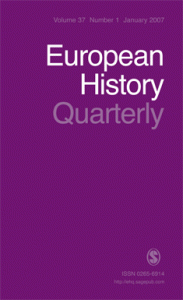 The new issue of “European History Quarterly” is now available online and includes the following articles:
The new issue of “European History Quarterly” is now available online and includes the following articles:
War Stories: French Veteran Narratives and the ‘Experience of War’ in the Nineteenth Century by Philip Dwyer
“The Revolutionary and Napoleonic Wars were the first in history to be written about in great numbers by the common soldier. This article, which focuses on French reminiscences of the wars, examines a variety of memoirs published from the late eighteenth through to the twentieth century. During this time we see a different approach to war and how it was recalled and remembered, more personal, more experiential than ever before. This article argues that the historical accuracy of these veteran narratives is unimportant. Instead, they reveal much more about how the wars were portrayed, and how they were remembered. Important too is what these narratives reveal to historians about the (inner) lives of soldiers during the wars, and what veterans in hindsight thought and felt about particular events. Here too the reality of the ‘experience of war’ is not as important as the cultural construct that is presented. As such, war narratives are an important source for the ways in which veterans and French society preferred to remember and process the past.”
Noble Status and Royal Duplicity in the Crown of Castile, 1454–1504 by Michael J. Crawford
This article examines the seemingly opposing actions of Castile’s late medieval monarchs, who both authorized the noble status of hidalgo for supporters and developed rules and legal procedures to limit the proliferation of this status. Addressing both royal policy and disputes over status in the territory of Seville during the second half of the fifteenth century, it demonstrates how local authorities strategically employed laws and appeals to royal courts to resist the recognition of those who claimed hidalgo status and to deny them related privileges. The actions of these monarchs and their subjects reveal the nature and limits of royal absolutism in matters of social status in the late fifteenth century and the degree to which the development of state judicial apparatus affected the local recognition of status and the growth of state power
Carton de Wiart’s Second Military Mission to Poland and the German Invasion of 1939 by E.D.R. Harrison
Poland’s strategy for fighting Nazi Germany has always been controversial. Was it necessary to confront the invaders close to the frontier, or should Poland’s forces have stayed much further back to allow a more viable defence? The head of the British Military Mission to Poland in 1939, Major-General Adrian Carton de Wiart, argued strongly but in vain for a defence in the interior. The Polish army proved inadequate against German forces using new lightning operations. The promised major offensive by France did not materialize. Carton de Wiart failed in his efforts to expedite material assistance from Britain, whose political and military leadership wrote off the Poles. Carton de Wiart and his officers continued to report to the War Office until Soviet intervention on 17 September brought an end to the Military Mission. After leaving Poland, the Mission produced invaluable accounts of the new German warfare but these had little influence on army practice. So there was a failure to learn from the fall of Poland.
Imperial Myths between Nationalism and Communism: Appropriations of Imperial Legacies in the North-eastern Adriatic during the Early Cold War by Sabina Mihelj
In contemporary scholarly discussions, political uses of imperial pasts are typically associated with the rise of modern nation-states and nationalist principles of identity formation. Although clearly important, this approach can lead us to neglect the appropriations of imperial myths based on other types of ideological frameworks. In communist Eastern Europe, official representations of the past followed the imperatives of a historical-materialist vision of history, which, at least in its initial form, necessitated a rejection of both imperialism and nationalism. It is therefore reasonable to expect that communist appropriations of imperial legacies were significantly different from those found in Western Europe at the time. This article examines these different uses of imperial pasts – informed by either communism or nationalism or both – by focusing on the competing perceptions of imperial history and heritage at the Italo-Yugoslav border during the early Cold War
